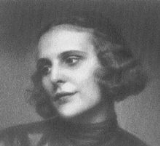
Leni Riefenstahl
Overview
Helene Bertha Amalie "Leni" Riefenstahl (ˈʁiːfənʃtaːl; 22 August 1902 – 8 September 2003) was a German
film director
, actress and dancer widely noted for her aesthetics
and innovations as a filmmaker. Her most famous film was Triumph des Willens
(Triumph of the Will), a propaganda film
made at the 1934 Nuremberg
congress of the Nazi Party. Riefenstahl's prominence in the Third Reich along with her personal friendship with Adolf Hitler
thwarted her film career following Germany's defeat in World War II
, after which she was arrested but released without any charges.
Triumph of the Will gave Riefenstahl instant and lasting international fame, as well as infamy.
Germany
Germany , officially the Federal Republic of Germany , is a federal parliamentary republic in Europe. The country consists of 16 states while the capital and largest city is Berlin. Germany covers an area of 357,021 km2 and has a largely temperate seasonal climate...
film director
Film director
A film director is a person who directs the actors and film crew in filmmaking. They control a film's artistic and dramatic nathan roach, while guiding the technical crew and actors.-Responsibilities:...
, actress and dancer widely noted for her aesthetics
Aesthetics
Aesthetics is a branch of philosophy dealing with the nature of beauty, art, and taste, and with the creation and appreciation of beauty. It is more scientifically defined as the study of sensory or sensori-emotional values, sometimes called judgments of sentiment and taste...
and innovations as a filmmaker. Her most famous film was Triumph des Willens
Triumph of the Will
Triumph of the Will is a propaganda film made by Leni Riefenstahl. It chronicles the 1934 Nazi Party Congress in Nuremberg, which was attended by more than 700,000 Nazi supporters. The film contains excerpts from speeches given by various Nazi leaders at the Congress, including portions of...
(Triumph of the Will), a propaganda film
Propaganda film
The term propaganda can be defined as the ability to produce and spread fertile messages that, once sown, will germinate in large human cultures.” However, in the 20th century, a “new” propaganda emerged, which revolved around political organizations and their need to communicate messages that...
made at the 1934 Nuremberg
Nuremberg
Nuremberg[p] is a city in the German state of Bavaria, in the administrative region of Middle Franconia. Situated on the Pegnitz river and the Rhine–Main–Danube Canal, it is located about north of Munich and is Franconia's largest city. The population is 505,664...
congress of the Nazi Party. Riefenstahl's prominence in the Third Reich along with her personal friendship with Adolf Hitler
Adolf Hitler
Adolf Hitler was an Austrian-born German politician and the leader of the National Socialist German Workers Party , commonly referred to as the Nazi Party). He was Chancellor of Germany from 1933 to 1945, and head of state from 1934 to 1945...
thwarted her film career following Germany's defeat in World War II
World War II
World War II, or the Second World War , was a global conflict lasting from 1939 to 1945, involving most of the world's nations—including all of the great powers—eventually forming two opposing military alliances: the Allies and the Axis...
, after which she was arrested but released without any charges.
Triumph of the Will gave Riefenstahl instant and lasting international fame, as well as infamy.
Quotations
I've never done anything I didn't want to, and nothing I've been ashamed of.
![]()
Hitler is a phenomenon that I admire, not a man I can fall in love with.
![]()
This film was pivotal in my life, not so much because it was my first successful effort as a producer and director, but because Adolf Hitler|Hitler was so fascinated by this film that he insisted I make a documentary about the Party rally in Nuremberg|Nuremberg. The result was Triumph of the Will|Triumph of the Will.![]()
On The Blue Light (film)|The Blue Light

